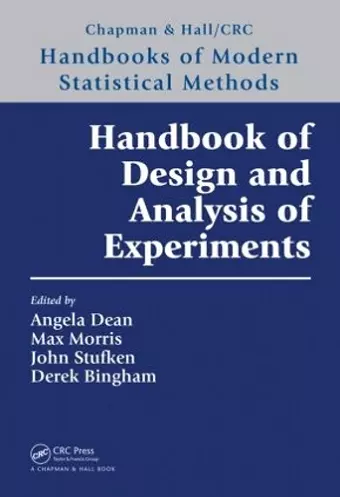Handbook of Design and Analysis of Experiments
Angela Dean editor Derek Bingham editor Max Morris editor John Stufken editor
Format:Hardback
Publisher:Taylor & Francis Inc
Published:26th Jun '15
Currently unavailable, and unfortunately no date known when it will be back
This hardback is available in another edition too:
- Paperback£71.99(9780367570415)

Handbook of Design and Analysis of Experiments provides a detailed overview of the tools required for the optimal design of experiments and their analyses. The handbook gives a unified treatment of a wide range of topics, covering the latest developments.
This carefully edited collection of 25 chapters in seven sections synthesizes the state of the art in the theory and applications of designed experiments and their analyses. Written by leading researchers in the field, the chapters offer a balanced blend of methodology and applications.
The first section presents a historical look at experimental design and the fundamental theory of parameter estimation in linear models. The second section deals with settings such as response surfaces and block designs in which the response is modeled by a linear model, the third section covers designs with multiple factors (both treatment and blocking factors), and the fourth section presents optimal designs for generalized linear models, other nonlinear models, and spatial models. The fifth section addresses issues involved in designing various computer experiments. The sixth section explores "cross-cutting" issues relevant to all experimental designs, including robustness and algorithms. The final section illustrates the application of experimental design in recently developed areas.
This comprehensive handbook equips new researchers with a broad understanding of the field’s numerous techniques and applications. The book is also a valuable reference for more experienced research statisticians working in engineering and manufacturing, the basic sciences, and any discipline that depends on controlled experimental investigation.
"The volumes should be of primary interest to researchers and graduate students from (bio)statistics, but also appeal to scientists where the methodology is applied to real problems. … Each section contains between two and five chapters. All chapters have been written by leading researchers. … Most of the chapters indeed provide a thorough overview of the state of the art in the theory of a specific subfield of design and analysis of experiments."
—Peter Goos, KU Leuven University of Antwerp, in Journal of the American Statistical Association, May 2017
"This handbook contains 25 thoughtfully assembled articles that have been written by leading researchers in the field of experimental design. The themes addressed by these articles are theories and computational methods in experimental design. They are well organized in seven sections that cover classical and new approaches for designing scientific experiments. Each section can be read independently from the others, and all articles within a section provide excellent references for further reading. … The reader can find here a rich theory and methodology in understanding traditional and new problems in experimental design, mostly from the frequentist point of view. At times, the material gets deep and technical but there are many useful references on theoretical and computational issues, which can be found throughout the book. Although it is hard to cover all existing research in experimental design, this handbook manages to give a comprehensive review of many fundamental approaches in experimental design. It is undoubtedly a valuable guide for researchers in statistics, as well as practitioners in the fields of engineering, medicine, biology, or any other discipline that uses experimental investigation. This book could be of value for graduate courses in advanced experimental design with a focus on optimal design theory. It could also be suitable for use as an additional text in any course in advanced experimental design."
—Tena I. Katsaounis, Ohio State University, in Technometrics, October 2016
"The volumes should be of primary interest to researchers and graduate students from (bio)statistics, but also appeal to scientists where the methodology is applied to real problems. … Each section contains between two and five chapters. All chapters have been written by leading researchers. … Most of the chapters indeed provide a thorough overview of the state of the art in the theory of a specific subfield of design and analysis of experiments."
—Peter Goos, KU Leuven University of Antwerp, in Journal of the American Statistical Association, May 2017
"This handbook contains 25 thoughtfully assembled articles that have been written by leading researchers in the field of experimental design. The themes addressed by these articles are theories and computational methods in experimental design. They are well organized in seven sections that cover classical and new approaches for designing scientific experiments. Each section can be read independently from the others, and all articles within a section provide excellent references for further reading. … The reader can find here a rich theory and methodology in understanding traditional and new problems in experimental design, mostly from the frequentist point of view. At times, the material gets deep and technical but there are many useful references on theoretical and computational issues, which can be found throughout the book. Although it is hard to cover all existing research in experimental design, this handbook manages to give a comprehensive review of many fundamental approaches in experimental design. It is undoubtedly a valuable guide for researchers in statistics, as well as practitioners in the fields of engineering, medicine, biology, or any other discipline that uses experimental investigation. This book could be of value for graduate courses in advanced experimental design with a focus on optimal design theory. It could also be suitable for use as an additional text in any course in advanced experimental design."
—Tena I. Katsaounis, Ohio State University, in Technometrics, October 2016
ISBN: 9781466504332
Dimensions: unknown
Weight: 1859g
960 pages